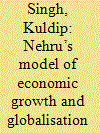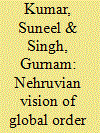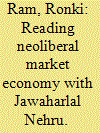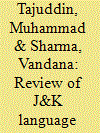|
|
|
Sort Order |
|
|
|
Items / Page
|
|
|
|
|
|
|
| Srl | Item |
| 1 |
ID:
135142


|
|
|
|
|
| Summary/Abstract |
In the present context of rejuvenation of ethnicity the world over, states in India having become more autonomous due to changes in party system, democratic mobilisation and globalisation, and some states operating in violation of the letter and spirit of the Constitution while dealing with minorities. The article analyses the nature of federalism as adopted in India in the peculiar situation of post-independence and partition, its working during Nehruvian and later periods and the changes it has witnessed both in terms of centralisation and decentralisation. The argument is that while federalism is an important device to manage diversity and to an extent has done well in India in that respect, it is not the panacea for justice to minorities. It can also be, and has been, used by majority groups as a tool for disempowering national minorities. What is therefore required is to understand federalism not merely in terms of centre–state relations or in legal and constitutional terminology, but in the context of economic, social, political and cultural forces. What is required is a multi-layered, democratic and non-hegemonic federal system that is responsive to both external and domestic pressures and serves the interests of minorities both territorially concentrated and spread over.
|
|
|
|
|
|
|
|
|
|
|
|
|
|
|
|
| 2 |
ID:
135143


|
|
|
|
|
| Summary/Abstract |
Nehru’s vision of Indian security can be understood at three different levels: conceptual, operational and capability. First, at the conceptual level, Nehru did not only identify national security with military threats but located it in a broader perspective by taking cognisance of non-military security threats. Second, at the operational level, notwithstanding the criticism that he received on the issues of Kashmir and China, Nehru managed to handle critical security threats by integrating the princely states into the Union of India. Their independence could have proved to be a perennial security threat because of their location. Apart from this, Goa as a Portuguese colony was another threat to Indian security, which was handled successfully in 1961 under Nehru’s leadership. Third, at the capability level, Nehru’s contribution to Indian national security is tremendous. Nehru was aware that India had to develop its political, economic, technological and military capabilities to secure itself in the comity of nations.
|
|
|
|
|
|
|
|
|
|
|
|
|
|
|
|
| 3 |
ID:
135145


|
|
|
|
|
| Summary/Abstract |
After almost three decades of economic reforms, the tasks Nehru outlined on the eve of India’s independence should be invoked for examining how far these reforms constitute a departure from the Nehruvian model. Putting an end to poverty, ignorance, disease and inequality of opportunities were the key goals Nehru outlined on the eve of India’s independence. Nehru valued these objectives not merely for their instrumental value to economic growth, but for their own sake. However, at the height of India’s drive for liberalisation, the welfare state came to be perceived as a hindrance to the country’s global march. With higher economic growth becoming the ultimate end, the Nehruvian logic of looking at economic development as essential for human welfare was largely abandoned. Economic reforms therefore constituted a departure from the Nehruvian model of economic development. The role of the state for regulating economies is now widely recognised at the global level. This necessitates a re-look at Nehru’s model of economic development.
|
|
|
|
|
|
|
|
|
|
|
|
|
|
|
|
| 4 |
ID:
135148


|
|
|
|
|
| Summary/Abstract |
This article argues that Jawaharlal Nehru’s vision of Asian identity was central to his view of India’s foreign policy. His vision enthused many in the last phases of World War II but the seemingly contradictory elements inherent in this vision ensured that it also had its critics within India, Asia and the world. However, by century’s end, the ideational framework that Nehru had so assiduously constructed since 1920 gained meaning in different contexts after Nehru’s demise. The vision of Asian identity that he put together began to inform Asian regional and subregional institutions and organisations. The analytical framework that he evolved, through non-alignment and the Panchsheel principles, presented an alternative to Cold War binaries. As a result, his view of Asian identity had positive implications for issues of conflict management, economic interdependence and community, the maintainence of peace by abjuring military alliances, guarding against the surrender of sovereign rights and, more recently, for a definition of security as human security. At home the task remains to reinvent his vision for a new phase in India’s foreign policy.
|
|
|
|
|
|
|
|
|
|
|
|
|
|
|
|
| 5 |
ID:
135146


|
|
|
|
|
| Summary/Abstract |
Rejecting the various ‘World Order Models’ being projected as a panacea for a lasting peace, Nehru visualised ‘World Union’ based on democratic principles to create an egalitarian social and economic order across the globe and to eliminate the recurring phenomena of conflict and tension which produce wars at regular intervals. The perceived ‘World Government’ could provide a platform to manage and eliminate the modern forms of warfare: ethnic conflicts, proxy wars, militancy, terrorism, etc., while accommodating and redressing the grievances and resentments of specific people across as well as within the borders of national units. A global legislature can provide the community of nations a uniform, codified and effective international legal order. The Nehruvian model which sought to create an egalitarian, ‘planned’ and ‘socialised’ world economic order by eliminating imperialism and colonialism in all forms and manifestations could be relevant to manage the global economic crisis and also for the development of underdeveloped world. A World Union based on democracy and freedom may protect individual and group rights against ethnic cleansings and genocides and may help to universalise the institution of democracy. A strong world government, suggested by Nehru, can control nuclear proliferation and save mankind from the scourge of nuclear war.
|
|
|
|
|
|
|
|
|
|
|
|
|
|
|
|
| 6 |
ID:
135144


|
|
|
|
|
| Summary/Abstract |
This article intends to explore how neoliberal market economy impacts social democracy in globalising India and examines its implications for the millions of Dalits. It argues that the institution of social democracy, which flourished in India during the Nehruvian era of mixed economy and welfare state, seems to be fast approaching its demise under the ongoing process of neoliberalism. It further argues that the fast-expanding domain of the corporate sector and the free flow of global capital, in conjunction with the gradual withdrawal of the welfare state, will not only widen inequalities, but also stifle the growth of social democracy in the country.
|
|
|
|
|
|
|
|
|
|
|
|
|
|
|
|
| 7 |
ID:
135147


|
|
|
|
|
| Summary/Abstract |
This article attempts to revisit Nehru’s ideology and to re-contextualise it in an era of globalisation. India has remained the reference point to assess Nehru’s ideology. His idea of nation and nationalism are discussed in the light of the recent attempts to redefine Indian nation and nationalism. Notwithstanding his commitment to secularism, Nehru also attempted to absorb Hindu communalist sentiments in the mainstream of Indian politics but at the same time he treated communalism as a grave threat to India’s integrity. Nehru’s vision to develop modern India not only with the help of science and technology but also by developing a scientific temperament and promoting democratic culture amongst people is the subject of debate. His views regarding the radical transformation of rural society through land reforms and community development programmes are discussed here. Nehru desired to reconcile the modern goals of economic development with traditional community values of small-scale agrarian societies. His contribution to consolidate democracy by gradually attaching the people to parliamentary institutions forms a significant component of this article.
|
|
|
|
|
|
|
|
|
|
|
|
|
|
|
|
| 8 |
ID:
135141


|
|
|
|
|
| Summary/Abstract |
Contemporary changes in the form of introducing structural reforms in the country and end of the Cold War at the global level have brought about significant transformations and new orientations in India’s domestic and foreign policies. Questions are being raised regarding the relevance of Nehru’s model of development and his foreign policy of non-alignment. Besides, a volatile socio-economic and political scenario in the country and prevailing non-polarity in the international milieu have created a situation of chaos and uncertainty. Hence, it becomes imperative to have a look at Nehru’s visionary philosophy so as to ascertain whether it can provide a solution to the new challenges faced by the country both at the domestic and international levels.
|
|
|
|
|
|
|
|
|
|
|
|
|
|
|
|
| 9 |
ID:
135150


|
|
|
|
|
| Summary/Abstract |
Political community is the basis of modern polity. In federation, two polities and their respective political communities are related according to the constitutional structure. Political community is constructed through mass education and its medium. Common mass education though a common language inculcates common values among peoples differing in their habitations, mother tongues and strata. Nehru’s visionary language policy defused centrifugal forces and strengthened centripetal forces in the process of Indian political community formation. Political community formation in Jammu and Kashmir began in the reign of Pratap Singh with the adoption of Urdu as the official language and the medium of mass education. The process was communalised in 1920s when the Urdu–Hindi controversy began. The communalised political communities were further broken into contesting ethnic communities after independence due to faulty language policies of successive governments. One polity with multiple political communities has become the biggest hurdle for integration of J&K with India.
|
|
|
|
|
|
|
|
|
|
|
|
|
|
|
|
| 10 |
ID:
135149


|
|
|
|
|
| Summary/Abstract |
Taking the legacies of colonialism and non-alignment of post colonial Asian countries, Nehru’s ‘Asianism’ ushered the solidarity of the Asian countries to promote peace and fashion a normative international order. His foreseeing of Asian prosperity through the ideology of ‘Asianism’ has to a large extent taken a commendable shape in the twenty-first century Asianism, where China and India have become the most powerful players. But ‘Asianism’ in reality has not been contemplated holistically in contemporary Asianism, because solidarity, growth and prosperity of Asianism have not been uniform. Taking the analogy of H.J. Mackinder’s ‘Heartland’ theory of 1904, while South, Southeast and East Asia represent the ‘heartland’ of current Asia, West and Central Asia even today remain stagnant, infested with disunity, militancy, religious fundamentalism and are victims of regional and extra-regional powers’ diplomatic game plan. Hence, normative Asianism should also bear the onus where the qualitative benchmark of Asia’s contemporary ‘heartland’ needs to catalyse the stagnant Asia to prosper, for the larger ideals of ‘Asianism’.
|
|
|
|
|
|
|
|
|
|
|
|
|
|
|
|
|
|
|
|
|